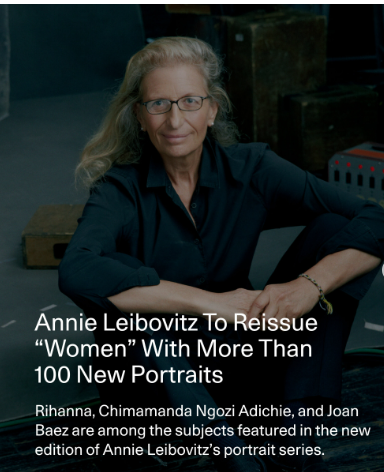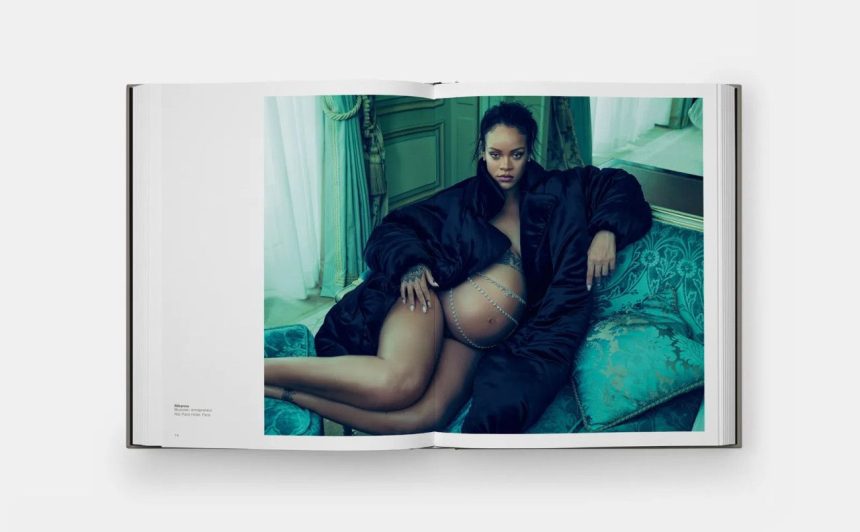Annie Leibovitz , one of the most influential photographers of the 20th and 21st centuries, returns with a renewed edition of her landmark work Women , paying tribute to the diversity , strength and polyphony of female identity . Twenty-five years after its first publication, Women is being republished by Phaidon in a two-volume collector’s edition that combines the original material with more than 100 new portraits of women from around the world.
Leibovitz states, “It’s not a work with a beginning, middle, and end. It’s an open, evolving project.” Through this work, women are presented not as symbols, but as themselves : Rihanna, Chimamanda Ngozi Adichie, Gloria Steinem, Joan Baez, Judith Jamison, and dozens of others, in settings that reflect their sphere of influence.
The portraits do not only seek visibility. They speak of heritage, independence and influence . Each image is a powerful voice in the collective narrative that redefines women’s relationship to power, femininity and the public sphere .
This edition doesn’t just depict women in different stages and roles of their lives — it recognizes them as active subjects redefining what it means to be a woman today . From the athletic field to culture, politics, and art, the renewed edition is an act of empowerment. It shows that women don’t just participate — they lead, create, and inspire .
This work is a reminder that inclusion is not just desirable, but necessary . As women from every corner of the world find and raise their voices, Leibovitz’s photographic language becomes the vehicle for telling stories worth hearing .
Through her lens, Leibovitz doesn’t just capture images — she records life stories . As she says, “Every woman I photograph has a story worth hearing. The portrait is just the beginning.” In a time when the fight for equal representation continues, Women serves as a mirror and a voice , illuminating every woman’s right to define her own image beyond stereotypes.
The power of the work comes not only from the fame of the individuals, but from the diversity of their experiences : women of young and old, from different social backgrounds, from every corner of the world, come together in a collective narrative. It is a celebration of authenticity , resilience, and the intersection of cultures, genders, professions, and personal journeys. As Gloria Steinem famously stated: “Inclusion is not just a demand. It is the only way to write the true story.”
Femininity, strength and fragility: Annie Leibovitz reexamines the image of women
Annie Leibovitz, nearly 25 years after the first publication of Women , returns with a powerful reissue: a two-volume photographic work that combines the original material with more than 100 new portraits. The work, published by Phaidon in November 2025, is not just a photo album. It is an evolving meditation on the concepts of femininity, strength, and fragility – and how we define these concepts through the image.
The original Women , with its accompanying essay by Susan Sontag, was a deeply personal work that challenged visual norms surrounding women. Portraits of women like Louise Bourgeois, Ruth Bader Ginsburg, and Sandra Day O’Connor demonstrated that visibility is not enough without acknowledging heritage and context.
In the new volume, Leibovitz invites new voices like Chimamanda Ngozi Adichie and Gloria Steinem, creating a generational dialogue around gender and power. Rihanna, photographed in late pregnancy, exudes a combination of maternal grace and iconoclastic defiance. Adichie, sitting alone in a library, embodies the silent power of thought.
Through her lens, Leibovitz doesn’t just capture images — she records life stories . As she says, “Every woman I photograph has a story worth hearing. The portrait is just the beginning.” In a time when the fight for equal representation continues, Women serves as a mirror and a voice , illuminating every woman’s right to define her own image beyond stereotypes.
The power of the work comes not only from the fame of the individuals, but from the diversity of their experiences : women of young and old, from different social backgrounds, from every corner of the world, come together in a collective narrative. It is a celebration of authenticity , resilience, and the intersection of cultures, genders, professions, and personal journeys. As Gloria Steinem famously stated: “Inclusion is not just a demand. It is the only way to write the true story.”
Dancers like Judith Jamison and Dwana Smallwood, writers, entrepreneurs, political leaders – all are presented not through static identities, but through action, presence, experience. Jamison stands majestically with her hair loose, while Smallwood is captured in movement – each image a poem of empowerment and grace.
The new edition of Women is not just an updated edition; it is a living archival work , continually written by women themselves. Women who do not simply inhabit spaces of power, but shape them. And in an era when the demand is not just representation but also meaningful participation, Leibovitz’s gaze reminds us: no image is neutral — every image is political.












